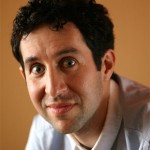Podcast: Play in new window | Download
Subscribe: Apple Podcasts | RSS

[amazon-product align=”right”]140132326X[/amazon-product]Francesca Rheannon talks with Eric Pooley about the politics of climate change. His book is THE CLIMATE WAR: True Believers, Power Brokers, and the Fight to Save the Earth. Also, Eli Kintisch on geo-engineering; his book is HACKING THE PLANET: Science’s Best Hope – or Worst Nightmare – for Averting Climate Catastrophe.
Eric Pooley, THE CLIMATE WAR
A record heat wave in Russia, with forest fires raging out of control. Record floods in Pakistan, 20 million people affected. Floods and mudslides in China — 1500 people dead there. And that’s just in one week! And more worries: Russia has announced a 25-30% drop in wheat production and cut off all wheat exports. And in Canada, wheat crops are off by 21% due to the opposite reason: excess rain. From climate scientists to Russian President Medvedev, agreement is growing that what is happening now is evidence of global climate change.
But the U.S. Senate hasn’t gotten the memo from Mother Nature. It looked like it might happen — last year the House passed the Waxman-Markey climate bill. While it wasn’t enough to cool the climate, it was a start. But, with the failure to pass any bill on the climate — or even energy — that start is now dead in the water for the foreseeable future.
Eric Pooley has written a spell-binding political thriller about who killed the climate bill and how they did it. It’s called THE CLIMATE WAR. Francesca went to the Bloomberg building in Manhattan where Pooley works as deputy editor of Business Week to talk with him.
Excerpt from Pooley’s The Climate War
More info:
Cost of Climate Action: pay now or pay later
Report from the Presidential Climate Action Project on what Obama could do right now to tackle the climate crisis without Congress
California’s choice: Build the future, or burn the planet (Salon)

Eli Kintisch, HACKING THE PLANET
[amazon-product align=”left”]047052426X[/amazon-product]Researchers in Europe have just come out with a new climate change model that says the tipping point for runaway climate change is a whole lot closer than we thought — 2015, a mere five years from now. If we don’t start cutting global carbon emissions by then, we’re toast — literally.
Or are we? Is there another approach, one that can buy us time? It’s the engineering that dare not speak it’s name –geo-engineering. That’s what science reporter Eli Kintisch writes about in his book HACK THE PLANET. It’s controversial — for one, when you start messing around with Mother Nature, there could be some serious unexpected blowbacks, like starving the ocean of oxygen. Or cutting off so much light from the sun, crops can’t grow. On the other hand, what we’re doing to the climate may force us to consider geo-engineering, just to buy us time until we can get our carbon emissions down to a safe level.
Eli Kintisch is a reporter for Science magazine, and he has also written for Slate, Discover, and The New Republic. In 2005 he won the Space Journalism prize for a series of articles on private spaceflight.
Coming up on The Climate Series from Writers Voice
Heidi Cullen, THE WEATHER OF THE FUTURE
Juliet Schor, PLENITUDE
John Michael Greer, THE ECOTECHNIC FUTURE
Heather Rogers, GREEN GONE WRONG

One problem is the definition of the solution as “clean” and “renewables”, when clearly, the actual solution is “low carbon” or “zero carbon”. The difference is “clean, renewables” is an old environmentalist line created before they even understood climate change was an issue. “Low carbon” on the other hand is what scientists say is what we need. Environmentalists want us to pay attention to “the science”, but not to what “the scientists” say is the solution, because scientists say we need all low carbon technologies that are available, i.e. nuclear power, and carbon capture. I argue this point with supporting documents at
http://theenergycollective.com/david-lewis/41986/science-mag-special-section-bleak-future-without-nukes-and-ccs
I also suggest that the failure of the US to pass climate legislation can partially be blamed on the green lobby itself, who would not compromise on nuclear until it was too late. I make my case here:
http://theenergycollective.com/david-lewis/40918/are-greens-responsible-killing-climate-bill
Pooley’s book is an interesting read for anyone interested in this issue. Thanks for doing this interview with him.
Thanks, David, for this comment. I agree that low or zero carbon is a much better term — one that takes climate change from being a subtext to front and center.
The point you make about nuclear was made by Jim Hansen in his interview with Writers Voice (https://www.writersvoice.net/2010/02/our-last-chance-to-save-humanity/) – that the environmental movement’s success with stopping nuclear now could come back to bite us.
Regarding the Kintisch book:
I read up to page 141 and saw no awareness of ocean acidification. I checked the index and looked up every reference to “ocean” anything, and found no discussion. After that I put the book aside – if this issue isn’t at the front of his mind while thinking about geoengineering, I thought, unfairly perhaps, whatever he thinks can’t be valuable. I intend to finish the book sometime though.
Could this mean scientists working in this field have no concerns about the oceans turning more acid, or did Kintisch overlook the topic? I was a bit horrified.
All the geoengineering techniques involving deflecting solar radiation away from the planet leave elevated CO2 in the atmosphere which is already and will increasingly affect ocean acidity.
The Royal Society issued a report on Ocean Acidification.
There is a book, Sea Sick, by science journalist Alann Mitchell. You might want to interview her. She was discussing on CBC Quirks and Quarks Canadian public radio science show how it was to bring up discussion of the bigger picture of ocean acidification with various ocean scientists she was interviewing as she studied arcane details:
“what does it mean for life on Earth? And they would invariably hang their heads, look sick to their stomachs and say, well its the end of life, as we know it, on the planet. If we don’t stop what we are doing”
Also: I found Kintisch’s use of the word “hacking” disturbing. The word hacking comes from the world of computers, which are as different from the natural world and the planetary system as a robot differs from a human being. A “hack”, performed on a program, can be a clever, elegant innovation, or a clumsy, kludgy workaround. Hacks are quick fix. The idea is to avoid the fundamental rethink involved when creating something from scratch. There is a definite aura of fun around most uses of the word, as it is used by the nerds who first used it. To get a good idea of the culture that created this usage of the word, read “The Hackers Dictionary”.
The idea that performing an emergency planet scale experiment at a time when the consequences of climate change have become so unbearable that people have become ready to try anything as a quick fix, such as an inherently untestable until first use at full scale scheme such as any that these “geoengineers” have come up with should be cheerfully called “planet hacking”, as if there was an element of fun to it, offended me repeatedly, as the word was shoved in my face throughout the book.
Again, thanks for your thoughtful comment. I will contact the Alann Mitchell about her book. Interestingly, when I think about the death of the oceans (which I first heard about from an oceanographer 30 years ago), my mind shuts down in reflexive horror, as well.